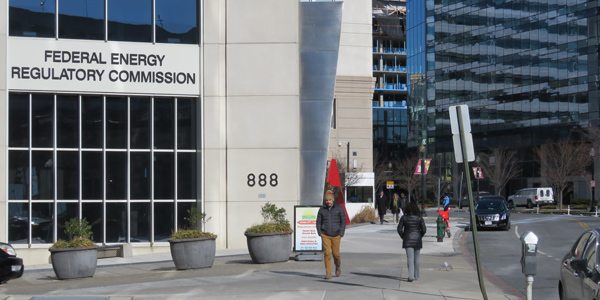By Michael Brooks
FERC last week denied multiple requests for rehearing and clarification of Order 860, its 2019 rulemaking lessening the reporting requirements of electricity sellers with market-based rate authority (MBRA) (RM16-17-001).
Currently, sellers are required to describe the activities of all their upstream owners, often requiring them to submit multiple amendments to their filings. Once the new rule goes into effect on Oct. 1, sellers will only need to identify their “ultimate” upstream affiliate — the furthest upstream owner. (See FERC Reduces MBRA Data Requirements.)
The commission denied requests to clarify several aspects of the order, including:
- NRG Energy and Vistra Energy’s request to clarify that an investor will not be considered a seller’s ultimate upstream affiliate based solely on holdings of publicly traded securities;
- the Edison Electric Institute’s request to extend the implementation timeline of the order’s requirements; and
- the Transmission Access Policy Study Group’s (TAPS) request for safeguards from being penalized for reporting errors. (“We expect that most inadvertently erroneous or incomplete submissions will be promptly corrected by reporting entities without the imposition of any penalty.”)
FERC did clarify in response to a request by TAPS that the public will have access to the relational database it will establish to collect all the required information. It also noted in response to EEI that this Thursday it will hold a technical conference, announced last month, to discuss the implementation and use of the database.

Types of market-based rate authority filings | FERC
The commission also denied a request for rehearing by several state consumer advocate agencies, which argued that it erred in not adopting its original proposal to require submission of connected entity information (CEI) and that traders of financial transmission rights and virtual products also submit affiliate information. The agencies “assert that the final rule deprives the commission of important tools to address and combat market manipulation and fraud,” FERC summarized.
In the alternative, the agencies requested that their arguments be filed in the docket that FERC created when it dropped the CEI proposal in order to leave it open for consideration (AD19-17), a request the commission granted.
The agencies also requested “that the commission expediently implement the connected entity proposal and any additional reforms offered in [AD19-17] given the clear potential for future market manipulation, fraud and default.” But in his partial dissent of last week’s order, Commissioner Richard Glick said that was unlikely to happen.
“The commission has relegated even those common-sense reforms to a hollow administrative docket that has not seen any action and likely never will under the commission’s current construct,” he said. “As I explained in my earlier dissent, the commission’s retreat from the … proposal is part of a troubling pattern in which the majority seems indifferent to detecting and deterring market manipulation.”
Order 861
FERC also upheld Order 861 — issued at the same time as 860 — which eliminated the requirement for sellers with MBRA to submit pivotal supplier and wholesale market share screens in PJM, ISO-NE, MISO and NYISO (RM19-2-001).

FERC headquarters | © RTO Insider
Sellers of capacity in SPP and CAISO, which do not have capacity markets, will still need to submit the screens. In explaining the reason for this in its original order — and in response to requests for CAISO to receive the same treatment as the RTOs — FERC said the soft offer cap in the ISO’s capacity procurement mechanism “is an estimate of the cost of new entry and does not necessarily reflect a mitigated, ‘going forward’ cost of any existing generator and does not address concerns regarding local market power.”
CAISO took issue with that description, requesting clarification that the “soft offer cap represents an estimate of going-forward costs plus a 20% adder, as opposed to an estimate of the cost of entry.” Pacific Gas and Electric went further and requested rehearing of the order based on FERC’s erroneous description of the offer cap, arguing that the commission should remove the requirement to submit indicative screens.
FERC granted CAISO’s request but said its error does not affect its determinations in Order 861, denying PG&E’s request.
“The commission declined to extend Order No. 861’s relief to capacity sellers located in CAISO for several reasons, including the lack of a transparent market price for capacity in CAISO and the fact that capacity sales are not reviewed, approved or monitored by CAISO,” FERC said. We find that these reasons continue to apply and, therefore, deny PG&E’s request.”




